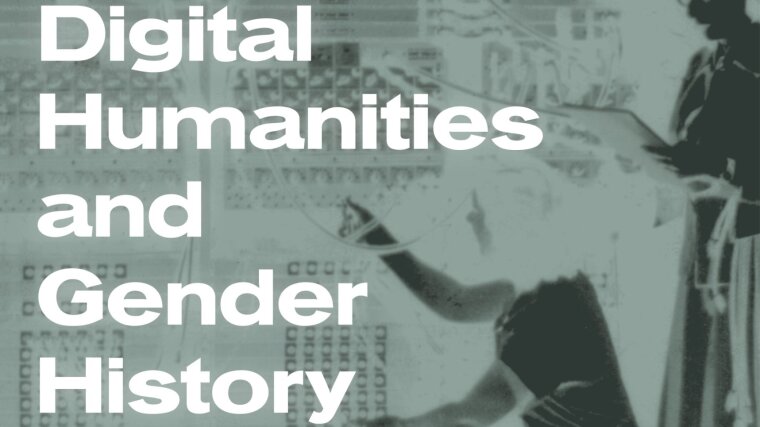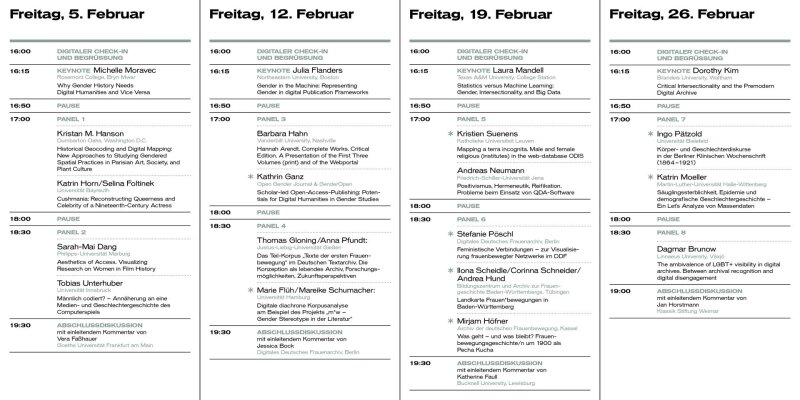
Im November 2021 ist der digitale Tagungsband "Digital Humanities and Gender History" in der Digitalen Bibliothek Thüringen erschienen. Der Band kann hierExterner Link eingesehen werden.
Der Lehrstuhl für Geschlechtergeschichte der Friedrich-Schiller-Universität Jena veranstaltet im Februar 2021 gemeinsam mit dem Arbeitskreis Historische Frauen- und Geschlechterforschung e.V.Externer Link und dem Digitalen Deutschen FrauenarchivExterner Link die digitale internationale Tagung „Digital Humanities and Gender History“.
Die Tagung möchte geschlechtergeschichtliche Aspekte der Geschichte des Digitalen und der Digital Humanities sowie die Anwendung von digitalen Methoden und Forschungsworkflows für geschlechtergeschichtliche Fragestellungen und Erkenntnisinteressen thematisieren. Gefragt werden soll nach den geschlechtergeschichtlichen Implikationen digitaler Methoden, Tools und Projekte ebenso wie nach den Möglichkeiten und Grenzen, Mehrwerten und Herausforderungen, die digitale Methoden für die Geschlechtergeschichte bieten.
Um die Zugangsdaten zu erhalten, melden Sie sich bitte bei pia.sybille.marzell@uni-jena.de für die Veranstaltung an. Die vier Tagungsnachmittage im Februar bilden eine Einheit, eine Teilnahme an allen vier Terminen wäre daher wünschenswert.
Follow on Twitter: #DHGH2021
-
Prof. Dr. Gisela Mettele
Mehr erfahrenSince 2010, Gisela Mettele has been Professor of Gender History at the Friedrich Schiller University in Jena. She completed her Magister Artium in Medieval and Modern History at Goethe University in Frankfurt/Main in 1989 and received her doctorate there in 1994. From 1994 to 2005, she was a research assistant at the Chair of Economic and Social History at Chemnitz University of Technology, where she completed her habilitation in 2004. She then did research at the German Historical Institute in Washington DC, and in 2007 took on the position of Acting Director there. She was also Lecturer in Urban History at the University of Leicester from 2007 to 2009. She is a member of the DFG Graduiertenkolleg Modell Romantik at the FSU Jena. In addition to women's and gender history, her research focuses on the history of religion, the history of the middle classes, Romantic studies, and the history of cities and urbanization.
-
Pia Marzell
Mehr erfahrenPia Marzell is a research associate at the Chair of Gender History at the University of Jena and is part of the team organizing the conference "Digital Humanities and Gender History". Since January 2021, she has been working on her dissertation about struggles of marginalized women in the New Women's Movement. Her research focuses on women's and queer movements in East and West Germany, the history of National Socialism and its implications in the present, and the history of sexuality.
-
Martin Prell
Mehr erfahrenMartin Prell studied history and religious studies in Jena and Leipzig. He is a research associate at the Chair of Gender History at the University of Jena and at the Goethe and Schiller Archive Weimar in the academy project "PROPYLÄEN - Research Platform on Goethe's Biographica". His research focuses on digital editions and historical network analysis applied to early modern sources.
-
Katharina Breidenbach
-
Pia Marzell
Mehr erfahrenPia Marzell is a research associate at the Chair of Gender History at the University of Jena and is part of the team organizing the conference "Digital Humanities and Gender History". Since January 2021, she has been working on her dissertation about struggles of marginalized women in the New Women's Movement. Her research focuses on women's and queer movements in East and West Germany, the history of National Socialism and its implications in the present, and the history of sexuality.
-
Gisela Mettele
Mehr erfahrenSince 2010, Gisela Mettele has been Professor of Gender History at the Friedrich Schiller University in Jena. She completed her Magister Artium in Medieval and Modern History at Goethe University in Frankfurt/Main in 1989 and received her doctorate there in 1994. From 1994 to 2005, she was a research assistant at the Chair of Economic and Social History at Chemnitz University of Technology, where she completed her habilitation in 2004. She then did research at the German Historical Institute in Washington DC, and in 2007 took on the position of Acting Director there. She was also Lecturer in Urban History at the University of Leicester from 2007 to 2009. She is a member of the DFG Graduiertenkolleg Modell Romantik at the FSU Jena. In addition to women's and gender history, her research focuses on the history of religion, the history of the middle classes, Romantic studies, and the history of cities and urbanization.
-
Andreas Neumann
Dr. Andreas Neumann is a research associate at the University History Research Center at the Jena University Archives and a lecturer at the Chair for Gender History at FSU Jena. His research interests lie in the field of social and cultural history of the 19th and 20th centuries with a focus on gender, university and educational history. In addition, he is concerned with the adaptation of social science methodologies in historical sciences.
-
Martin Prell
Mehr erfahrenMartin Prell studied history and religious studies in Jena and Leipzig. He is a research associate at the Chair of Gender History at the University of Jena and at the Goethe and Schiller Archive Weimar in the academy project "PROPYLÄEN - Research Platform on Goethe's Biographica". His research focuses on digital editions and historical network analysis applied to early modern sources.
-
Anselm Scheck
Anselm Scheck received his B.A. from Kalamazoo College after having studied there during the years 2014-18. He majored in political science and minored in history and French. Since autumn 2019 he has been acquiring his M.A. in modern history at the Friedrich-Schiller-Universität Jena. He will write his Master’s thesis on certain groups of plebeian and proletarian women in Saxony during the years 1847-49. His general interests include the history of Marxism and of the labor movement in Europe.
-
Regula Selbmann
Regula Selbmann is a student of social theories at the University of Jena. Her research interests are gender studies and research on the extreme right and authoritarianism. She is a research assistant for the conference "Digital Humanities & Gender History" at the Chair for Gender History at the University of Jena.
Programm
Programm_1
Bild: Katharina ZimmerhacklKonferenzmaterialien
Den Zoom-Link, die asynchronen Vorträge, aufgezeichnete Beiträge sowie weitere Informationen für die Teilnehmenden finden Sie nach Tagungs-Anmeldung im internen BereichDieser Link erfordert eine Anmeldung.
English Version:
Place: Zoom
Dates: 5.2., 12.2., 19.2. and 26.2.2021, 4 - 8 p.m. CET
Languages: English, German
The Chair of Gender History at the Friedrich Schiller University of Jena, together with the Arbeitskreis Historische Frauen- und Geschlechterforschung e.V.Externer Link and the Digital German Women's Archive (Digitales Deutsches FrauenarchivExterner Link), is organising a virtual international conference on "Digital Humanities and Gender History" on the four Friday afternoons of February 2021.
The conference aims to address gender-historical aspects of the history of the digital and the digital humanities as well as the application of digital methods and research workflows for gender-historical questions. The conference will examine the gender-historical implications of digital methods, tools and projects as well as the possibilities and limitations, added values and challenges that digital methods offer for the study of gender history.
The four conference afternoons in February form a unit, so participation in all four dates would be desirable. The conference languages are English and German. We are currently planning to provide automatic simultaneous English translation of the German contributions.
To receive access, please register for the event at pia.sybille.marzell@uni-jena.de.
Please see above for the conference program and the access to the asynchronous conference material.

